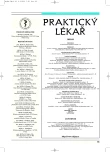Group B Streptococcus infection, screening, treatment - recommendation
Infekce streptokoky skupiny B, screening, léčba v těhotenství - doporučené postupy
Infekce streptokoky skupiny B (group B streptococcus - GBS, Streptococcus agalactiae) je významnou příčinou perinatální mortality a morbidity. Proto by se screeningu streptokokové infekce měly podrobit všechny těhotné ženy (s výjimkou žen s GBS pozitivní kultivací moči kdykoliv v průběhu těhotenství) mezi 35. až 37. týdnem těhotenství, kdy se odebírá kultivace z dolní třetiny pochvy. Bude-li kultivace z pochvy pozitivní, tak antepartálně ženu nepřeléčujeme (celkově ani lokálně), profylaxi podáváme až intrapartálně (při odteklé plodové vodě či při nástupu děložní činnosti), kdy aplikujeme antibiotika v infuzi. Léky první volby jsou antibiotika penicilinové řady. Při alergii na penicilinovou řadu s nízkým rizikem vzniku anafylaxe lze podat cefalosporiny. Při alergii s vysokým rizikem vzniku anafylaxe podáváme linkosamid - klindamycin nebo makrolid - erytromycin. Antibiotikum je nejvhodnější podat více než 4 hodiny před porodem, jinak nebezpečí kolonizace plodu dramaticky narůstá. Při porodu vždy informujeme pediatra o kolonizaci matky.
Klíčová slova:
streptokoky skupiny B - Streptococcus agalactiae - screening - kolonizace pochvy - kolo¬nizace novorozence - GBS infekce - GBS sepse.
Authors:
A. Měchurová
Authors‘ workplace:
Ústav pro péči o matku a dítě, Katedra gynekologie a porodnictví, Praha, ředitel doc. MUDr. J. Feyereisl, CSc.
Published in:
Prakt. Lék. 2006; 86(2): 92-94
Category:
Therapy
Overview
Group B Streptococcus infection (GBS, Streptococcus agalactiae) is asignificant cause of perinatal mortality and morbidity. Thus all pregnant women (withthe exception of those with a positive urine culture for GBS at any time during pregnancy) should undergo screening for streptococcus colonizationat 35 to 37 weeks of gestation with a vaginal culture from the lower third of the vagina. If the vaginal culture is positive, we do not treat the patient antepartum, but perform intrapartum prophylaxis (when membranes are ruptured or at the onset of uterine contractions) with the administration of intravenous antibiotics. Penicillin antibiotics are the first choice of treatment.
If the patient is penicillin-allergic with a low risk of anaphylaxis, we administer cephalosporins. If there is a high risk of anaphylaxis, we administer a lincosamide - clindamycin or a macrolide - erythromycin. It is most beneficial to administer the antibiotics more than 4 hours before delivery, otherwise the risk of colonization of the neonate dramatically increases. At delivery, the pediatrician must always be informed of maternal colonization.
Key words:
group B Streptococcus - Streptococcus agalactiae - screening – vaginal colonization - neonatal colonization - GBS infection - GBS sepsis.
Labels
General practitioner for children and adolescents General practitioner for adultsArticle was published in
General Practitioner

2006 Issue 2
- Advances in the Treatment of Myasthenia Gravis on the Horizon
- Hope Awakens with Early Diagnosis of Parkinson's Disease Based on Skin Odor
- Memantine in Dementia Therapy – Current Findings and Possible Future Applications
- Memantine Eases Daily Life for Patients and Caregivers
- Possibilities of Using Metamizole in the Treatment of Acute Primary Headaches
-
All articles in this issue
- IgA nephropathy – the most common primary glomerulonephritis worldwide
- Ergomentry under physical load
- Group B Streptococcus infection, screening, treatment - recommendation
- Smoking attributable mortality in the Czech Republic in 2002
- The differences costs of public health insurance funds for the extension life expectancy in Czech Republic between years 1995–2003
- The long pentraxin PTX3 – a new acute phase reactant
- The determination of concentration of exhaled nitric oxide – a new diagnostic method for evaluation of bronchial asthma
- General Practitioner
- Journal archive
- Current issue
- About the journal
Most read in this issue
- Group B Streptococcus infection, screening, treatment - recommendation
- IgA nephropathy – the most common primary glomerulonephritis worldwide
- Ergomentry under physical load
- The long pentraxin PTX3 – a new acute phase reactant
